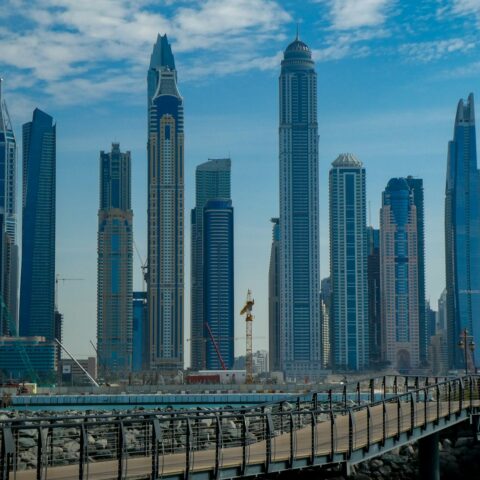Merger Filing Thresholds Under The UAE’s Competition Law

The issuance of Federal Decree Law No. 36 of 2023 Regulating Competition (the “Decree-Law”), which came into effect on 29th of December 2023, significantly revised and updated the UAE’s competition law framework, replacing Federal Law No. 4 of 2012.
On 20 January 2025, the UAE Cabinet supplemented the Decree-Law with the highly anticipated Cabinet Decision No. 3 of 2025 (the “Resolution”), establishing newly defined merger control thresholds. Effective from 31 March 2025, the new regime requires businesses to obtain regulatory approval for transactions based on a turnover test.
Offering more clarity and certainty, the Decree-Law, along with the Resolution, is intended to align the UAE’s competition law framework with global standards such as the International Competition Network Recommended Practices for Merger Notification and Review Procedures.
Table of Contents
Scope of Applicability of the Decree-Law
Articles 3 and 4 of the Decree-Law lay down the scope of applicability and exclusions. As per these provisions:
- All economic activities affecting competition within the UAE, whether conducted within or beyond its borders, are regulated by the Decree-Law.
- However, economic activities carried out by undertakings owned by the Federal Government, or the government of an Emirate are excluded from the application of this Law on specific grounds.
- As per the Resolution, the new thresholds apply solely to UAE-market-specific turnovers and market shares.
Definition of Relevant Market:
The definition of the Relevant Market under the Decree-Law expands its scope from the 2012 law. The Relevant Market now comprises two elements: Relevant Products and Relevant Geographic Area.
- The Relevant Product Market consists of products or services that, by virtue of their price, characteristics, and intended use, are considered interchangeable to meet a particular need of the consumer.
- The Relevant Geographic Market constitutes the physical or digital location where the supply and demand for products or services converge, and where competition conditions are similar or homogeneous.
Hence, products and places (where the supply and demand converge) of both physical and digital nature are included under its scope.
What are the Minimum Thresholds for Economic Concentration Operations?
Economic Concentration Operations involve actions such as mergers or acquisitions, where one entity partially or wholly gains control over another by purchasing ownership, acquiring usufruct rights, or buying shares, equity, obligations, etc. This process ultimately empowers the entity to directly or indirectly control the other.
Previously, merger filings were required only when entities met the market share threshold. The introduction of a turnover threshold is one of the key changes under the new competition law regime.
Merger Control Rules:
The new Resolution requires all Economic Concentration Operations and related transactions to be mandatorily filed. An application to the Ministry of Economy must be submitted at least ninety (90) days before completion, if the transaction meets either of the following thresholds during the last fiscal year:
- Turnover Threshold: When the total annual sales of the concerned entities in the Relevant Market in the UAE exceed AED 300,000,000 (Three Hundred Million Dirhams); or
- Market Share Threshold: When the total market share of the concerned entities exceeds 40% of the total sales in the Relevant Market within the UAE.
Market Dominance Rules:
An entity is considered to hold a dominant position when it possesses a strong presence in the market, enabling it to control or significantly influence the functioning of the Relevant Market.
An entity is deemed dominant if:
- Its market share, independently or jointly with other establishments, exceeds 40% of total transactions in the Relevant Market; or
- It can influence market conditions in a manner that restricts competition.
Timeline
Entities must file merger control notifications at least 90 days before the completion of the transaction. The Ministry of Economy shall issue a decision within 90 days of filing, which may be extended by 45 days.
If no decision is issued within this timeframe, the application is deemed rejected. However, the applicant may appeal such a rejection within 30 days from the date of receiving the decision.
Penalties
Entities that meet the aforementioned thresholds but fail to notify or file as required shall incur a fine of not less than 2% and not exceeding 10% of their total annual turnover or total revenue from goods/services in the UAE during the last fiscal year.
If the annual turnover or revenue cannot be determined, the penalty shall be a fine of not less than AED 500,000 (Five Hundred Thousand Dirhams) and not more than AED 5,000,000 (Five Million Dirhams).
Implementing Regulations
Assessment of the thresholds shall align with the implementing regulations, which will address matters such as filing fees and procedural rules. These regulations have not yet been issued by the competent Ministry but are highly anticipated, as they are expected to clarify existing ambiguities and procedural gaps.
Conclusion:
The 2023 Decree-Law, along with the new 2025 Resolution, marks a significant reform in the UAE’s competition law regime. This robust framework introduces enhanced regulatory oversight and clearer merger control requirements, with thresholds designed to align with international best practices.
Businesses must ensure compliance by thoroughly assessing transaction timelines and the potential impact on the UAE market. Navigating this complex framework is best undertaken with the support of a qualified legal expert.
Contributed by – Kripa Mariya
By entering the email address you agree to our Privacy Policy.



